- Home
- Ella James
Murder Page 4
Murder Read online
Page 4
I use a computer program to determine which interventions are worthwhile and helpful. For example, five bears living in a three-hundred-acre enclosure is a lot of bears on not much land, so without some tweaks to make the small environment more nutritionally rich than “regular” nature, my bears might not thrive.
My program calibrates several dozen variables, every factor from the number of years the bears have inhabited the same acreage, to number of bears in the enclosure during each month of the total enclosure time, to number of various types of plants that yield various berries, etc.
Some of my grants require me to keep physical data on the bears, so two to three times a year, they’re sedated, and I draw blood. I analyze it for nutrition, among other things, so I can adjust their vitamins accordingly.
Five bears is my max capacity. That includes three long-term inhabitants and two transients.
Harold is the oldest and tamest—a former circus bear who would never survive outside captivity, so I enrolled him in a long-term study on osteo-health conducted by a veterinary school in Alabama. Harold is leery of top hats and petrified of whips and sequins. Which is fine, because I’d look nuts in a top hat, and considering my perma-single status, I’m not really one for whips or sequins.
My second-most-laid back bear bud is Aimee. Aimee is a dude, but his owner—a chain-jewelry-store magnate—didn’t know that when she bought him on the black market. When she called me about taking custody of Aimee, the photo she emailed featured Aimee in a purple “ear bow.” Whether Aimee could be released into the wild in some capacity isn’t clear yet. I’ve been monitoring him carefully and recording data since he came to me in February.
Brooksie is a former petting zoo captive and a lightning-fast tree climber. Like Aimee, she may be capable of living in the wild, particularly if she’s tracked and monitored. Since she’s female, releasing her would be particularly gratifying; she would likely reproduce. Until then, I’ve had to program my tracking software to give me an alert when she and Aimee are in the same area.
Fourth on my roster is Cinnamon, a three-year-old female who’s spent all but the last five months in the wild. She’s here only because her leg was badly injured in a poacher’s trap this summer. She’ll hunker down on my land when it gets cold, and next spring she’ll be tagged and released.
Last, there’s Papa Bear, my secret fave. When a family in rural Virginia found him as a cub, they called him “Boo Boo.” For years, this family caged Papa with their four Dobermans. They fed him table scraps and tried to “train” him. By the time I got a call from an Appalachia humane society last December, poor Papa Bear was dangerously thin and so unruly, he was being given sedatives.
I took him in early January, even though I knew it was a risk. The crew who brought him recommended I wear a maim-proof vest and helmet, but I just nodded and told them where to lay his tranquilized body in my isolation pen.
The isolation pen is the acre of the enclosure closest to my house and my stock shed. It’s not in play unless I choose to partition the acre off, something I only do for very ill bears or bears like Papa, who have been kept in such tight quarters that releasing them into a large space would frighten them.
Papa expected to be fed and watered regularly. He’d never had food fit for a bear. His coat was dull and thin, his body lean enough that I remember thinking that first day, as I watched him sleep, he almost looked like a tall human in a bear suit.
I watched him wake up and walk around in circles that day, moaning and chuffing. His body shook from the anesthesia required to transport him to my place. His eyes darted around—looking for other animals? He’d spent his entire life with dogs, except the previous three weeks, when he’d been kept at a shelter.
Clinging to my cell phone, with my tracking program zeroed in on Papa’s small green dot, I went into my cabin and cried.
Gradually, I started reading more about techniques developed by other caretakers in a similar position. Things that might help Papa.
For the remainder of last winter, I found myself obsessed with him. I started talking to him through an opening in the fence. I started throwing cardboard tubes filled with berries and honeycomb over the fence, teaching him, with the tubes, to do normal bear things, like forage for food. The frozen vitamin ball bombs I threw over the fence got his coat looking shiny. I brought him black cherries and hickory nuts that helped him put on weight.
Then in July, just a few weeks after I opened the isolation pen and granted Papa access to the other bears, he cut his foot on something and got an infection. I called my friend Sam, a large-game vet who works at the Memphis Zoo, and he came out and helped me sedate Papa. He cleaned and wrapped the wound, then left me with antibiotics and promised to return in a few days.
I took the opportunity to sit with my sleeping friend.
To my shock and horror, Papa Bear woke up early. I had my arm around his neck. He raised his head and made a keening sound. I stood slowly. He lumbered up and looked right at me. Shaking, and with glazed eyes, he nuzzled me. All the blood drained from my face. He made a roaring noise, and just as my sweating fingers reached for my bear spray, he nuzzled my arm. Since then, he comes to me and leans against me every time I go into the enclosure. I guess he wants the nurturing he never got.
I’m feeling pretty chipper as I punch my code—010212—into the gate and stride to the stock shed just inside.
The weathered shed came with the property, a relic from an old moonshine operation. I thought it was cute, so I reinforced the worn, wood walls from the inside, laid a cement floor, and installed metal shelving, plus a refrigerator and a tiny sink. I punch the same code into the lock beside its door and pull the door open.
Creak…
I see a swirl of snowflakes that aren’t here. I smell gardenias, feel the numb cold seeping through my boots. The clink of tire chains against ice is loud enough to drown out every thought inside my head. A year ago, my next move would have been to crouch under the metal shelves and put my head on my knees. Now I stop and take a breath. I count while I release it, imagining the memory running through me like the white fog of a ghost.
Sometimes certain sounds will bring on a flashback. I’ve noticed the triggers are often clinks and beeps and creaks—like the creaking of the shed’s door just now. Since I don’t consciously remember anything like that, I’ve decided they’re probably sounds from the emergency vehicles.
I take a few more deep breaths and close my eyes. “I’m right here, and I’m completely fine.”
I open the freezer and pull out an ice block of berry mash and vitamins, then pull a wood box off the nearest shelf, lift the lid, and drop the ice block in.
Keeping track of supplies and food is one of the most boring aspects of my job, so I try to liven it up with music. I pull the iPhone band off my upper arm and search my song list for one that fits my mood.
Jason Isbell, “24 Frames.” I try to let the singer’s voice blot out my troubles while my hands get busy fastening my work belt around my hips and grabbing my clipboard off a nail in the wall.
According to my log, I need to spread some cedar shavings near the pond, sink a box of frozen treats, and toss four vitamin ball bombs into the trees.
I tap my foot against the cement floor and sing along with Jason while I slip the vitamin bombs into the pockets of my belt and pile cedar shavings in the middle of a canvas blanket. I shake my ass as I knot the blanket’s four corners, creating a big pouch I sling over my shoulder. Finally I mute my music, tuck the treat box under my arm, and step outside into the filmy morning light.
It’s cold today; colder than yesterday, I note, as I trudge toward the pond’s edge. I look at the leaves spread over the damp ground, papery jewels of gold, red, orange, and brown. My gaze wanders the dense treeline. Spindly branches and barren-looking trunks, crooked tree fingers curled between the tall, green pines. Autumn’s cloak is spread around me. Soon the leaves will rot. It will be winter.
Shut up, Gw
en, and focus on the present time.
I kneel beside the pond’s soggy fringes, set the box down, and shift the woodchip pouch down to the ground. It feels good to throw the treat-filled box at the water. It lands with a splashy slap and bobs a second before sinking. Soon the bears will smell it and come poke around. Whoever gets it first will enjoy the challenge of opening the lid.
I try to focus on my hands as I spread the woodchips along the water’s edge. Black bears love to roll in cedar chips.
When I’m finished, I pull out my phone and check the bears’ locations. Hmm, so I’ve been scented.
I toss a vitamin ball bomb into the trees and exhale slowly as Aimee and Cinnamon stroll out of the woods. Even though I don’t come at the same times or on the same days of the week, even though their enclosure is vast, sometimes they still scent me. Which, given that a black bear’s nose is seven times more powerful than a bloodhound’s, shouldn’t surprise me but still does.
I toss two more vitamin ball bombs and am turning to go when I hear the well-timed crunch of leaves. Papa Bear. He stops between a pine tree and a big, old oak and blinks in my direction.
“Hey there, Papa.”
Glee spreads through me.
As if he knows, Papa Bear’s big, black body shuffles closer to me. He lifts his head, his black eyes peering up at me. I give him a reassuring smile.
“Hey, handsome.”
I hold my hand out, palm up, like I’m a waitress preparing to carry a plate. I raise it slowly, then turn my palm over, so it’s facing the ground. Papa Bear shifts closer to me. Another lumbering step, and his head is right under my palm. He rises up, and I feel the soft warmth of his head against my hand.
“There ya go,” I whisper.
This is what I trained for, what I live for.
Papa nuzzles my hand, and I sift my fingers through his coarse fur. He leans slightly against me, almost knocking me over with his weight. It makes me laugh.
He makes his happy noise, a borderline illicit sound that’s outright silly. I feel his legs shift as he leans against me.
“You’re a good guy. You know that, right?”
Papa nuzzles me with his nose before he waddles off into the trees. I head back toward the gate, feeling elated.
As I’m stepping through it, onto the pebble path that leads back to my porch, I hear a loud thwak!
FOUR
GWENNA
All my muscles lock up as my face flushes and my heart races.
Thwak!
My hand dives into my pocket, wrapping around the handle of the .38 as my eyes fly around the woods.
Thwak!
The sound is somewhat distant, not right here but not far either.
Thwak!
THWAK!
It sounds like…someone punching a taut piece of material. Or jumping on one of those small, indoor trampolines…
I step forward, hand still in my pocket, wrapped around the gun. Two more thwaks confirm the bow noise is coming from a single location.
BOW noise!
Could that be the sound of arrows flying through the air, then hitting something?
Thwak!
The thought ratchets my heart rate up a notch, enough so that I have to take a big breath and let it out slowly before I walk toward the sound.
Thwak!
Thwak!
I point myself at the woods directly behind my house, at the small swatch of forest I own that’s not within the walls of the enclosure: the area where, farther up the hill, I do my workout in the clearing. Then I adjust course so I’m walking in a trajectory that will lead me to the property line between my land and Mr. Haywood’s.
Thwak!
I swallow hard. Maybe it’s not a bow, I tell myself. Maybe someone’s chopping down a tree. The new homeowner. But it doesn’t really sound like that, and anyway, it couldn’t be the new owner. The offer was only just accepted.
Thwak!
I should go home. Instinct tries to tug me that way, but curiosity pulls harder. It’s my nature. I walk deeper into the woods, hating the crunch of my boots on the dry leaves. My hand is still in my pocket, because if someone was watching me—and I tell myself they’re definitely not—I wouldn’t want them to know I have a gun on me. Not yet.
Thwak!
I walk about twenty more yards before it’s unmistakable: the sound is coming from the land to the right of me, from the Haywood property.
Probably a workman.
Thwak!
The sound is so loud, it rings so clear through the quiet woods, I’m almost sure now: it’s a bow. Suddenly I remember I have my monocular. I can feel it up against my middle finger’s knuckle, in my pocket by the gun. I use it to bird-watch sometimes.
I lift it to my eye and look around, but I’m not at an angle where I can see the land directly behind the Haywood house; it sits on ground a little higher than my own.
I curve back into the woods before resuming my straight line toward the Haywood place. If someone is shooting arrows at a target, I don’t need to get too close.
I stop again and look through the monocular. And there he is. This…man. I stare for a long moment, my lungs emptied of air, my throat tightening with something that feels an awful lot like pain. I don’t even blink, so my eyes water a little. But I can’t take them off him. It’s as if my entire being is holding still while the imprint of him is recorded somewhere deep inside me.
The sensation is uncomfortable. Achy. I draw a deep breath, and my brain seems to un-freeze. My eyes leap into action and start cataloguing details. As soon as my heart releases its grip on me, it’s pathetically obvious why I reacted so viscerally to him.
The man is stunning. Stunning. I’ve seen more than my fair share of beautiful men—models for Ralph Lauren, Armani, Versace, Calvin Klein, Abercrombie. I used to shoot alongside them. So I can judge him with authority.
I breathe gently and roll my gaze over him a few times, like a talent scout seeking a flaw. I find nothing, neither in his technique with the bow nor with his aesthetics. I blink a few times, trying to shake off the dazed feeling I have, before I study each fine feature, starting with his hair. It’s black—or very dark brown—and it’s somewhere on the line between short and long. I think it’s curly. Yes, it must be. It’s not long enough to be a bona fide mane. The curls are more like cresting waves. They shake a little as he takes an arrow from a small, vertical wood box on the ground beside him. I note a curl that’s pasted to his forehead.
His skin is slightly pale, and damp with sweat. My gaze drifts down to his dark brows. They’re model eyebrows: thick, strong slashes that command my gaze. Beneath them are a pair of long-lashed eyes that might be gray or blue. They’re beautiful and shrewd. No doubt about that. His eyes are in the running for Most Prominent Feature. Below them, he’s got a strong, straight nose—actually…it might be ever-so-slightly crooked; I can’t tell from here. It’s framed by high, stark cheekbones that lend him a slightly feline look. His ultra-light beard—only a little more than a shadow—is just enough to give his jaw delectable definition. And his lips. Dear God. I’m not sure I’ve ever seen more gorgeous full and sultry lips.
The wavy hair, the piercing eyes, that godly mouth— the way those lovely features contrast with his sharp bones, the straight line of his nose and the cut of his jaw, the roughness of the dark beard and the slight circles underneath his eyes— It’s damned impressive. Classic.
Armani? Or maybe he’s more Dolce & Gabbana? Definitely not delicate enough for Ralph Lauren. Probably not quite slim enough for Calvin Klein.
He’s like a next-gen Peter Badenhop. And wouldn’t that be fun? Peter is actually super nice and down to earth.
My gaze lingers on the slight furrow between his brows as he notches the arrow with his right hand and slowly draws the cord back. For a second I’m distracted by the way he holds the bow with his left hand: strangely—his pinkie and ring finger held out straight rather than gripping the curve of the bow. Then his tongue d
arts over his lower lip, and he lets the arrow fly.
My eyes follow it about thirty yards forward, to a round, red target strapped to the front of an oak tree. The arrow is the latest of many.
My gaze latches back onto his tall, strong form as he looks down into the box, then straightens up, showing off his wide shoulders, which are clad in a dark blue thermal shirt. The pants that move with his long strides toward the arrows are dark charcoal—that or faded black. I look down to his black boots: well-worn. He’s tall. Big. He wouldn’t make a photographic match for me despite our shared traits of striking eyes, straight noses, and full lips, because he’s so much taller.
My heart tumbles and my body freezes.
He wouldn’t make a match for you at all, Gwen.
I draw a big breath. In that millisecond all my interest in him, all my admiration of his flawless face and form, curdles.
I watch him pull the arrows from the target with an angry-looking fist. I watch his pretty mouth: so taut and flat, as if he’s frustrated. I watch his brow tighten as he grabs the last arrow out, clenching his hand around it. He puts the arrows under his left arm—strange, when he could hold them in his fist—and strides quickly, with lion-like grace, to his spot just behind the home’s back deck.
Like a model, his movements are elegant and sparse. Actually, he’s probably smoother than most of the ones I knew. I watch his face for one more moment. He’s definitely a doppelganger for Peter Badenhop. Except this guy is bigger. Starker. Honestly, more striking.
I sigh softly.
So that’s my neighbor. Beautiful McBeautyMan. Who looks amazing with his arm pulled back, the bow in hand.
I watch him shoot, and watch the arrow hit the bull’s eye.
Wow. He’s good.
I’m sure he has a good ego to match.

 Murder
Murder Chosen
Chosen Selling Scarlett
Selling Scarlett Hansel, Part Four
Hansel, Part Four Fractured Love
Fractured Love Exalted
Exalted Trapped
Trapped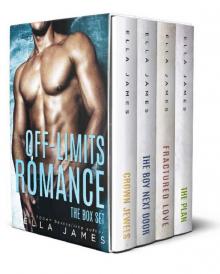 Off-Limits Box Set
Off-Limits Box Set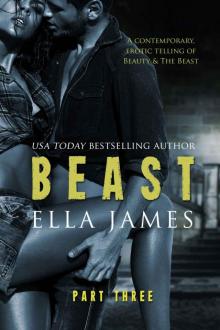 Beast, Part Three
Beast, Part Three Crown Jewels
Crown Jewels Red & Wolfe, Part II: An Erotic Fairy Tale
Red & Wolfe, Part II: An Erotic Fairy Tale Beast, Part One
Beast, Part One The Boy Next Door
The Boy Next Door Here
Here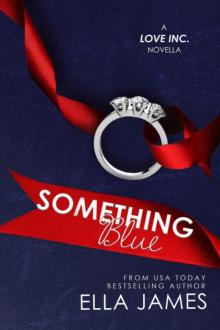 Something Blue
Something Blue Stolen
Stolen Sloth
Sloth Sexy Beast
Sexy Beast The Plan: A Standalone Off-Limits Romance
The Plan: A Standalone Off-Limits Romance Unmaking Marchant
Unmaking Marchant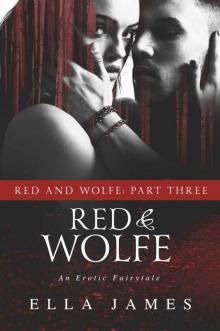 Red & Wolfe, Part III: An Erotic Fairy Tale
Red & Wolfe, Part III: An Erotic Fairy Tale Hansel, Part Two
Hansel, Part Two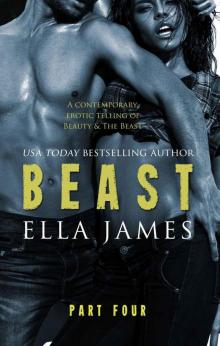 Beast, Part Four
Beast, Part Four Red & Wolfe, Part I: An Erotic Fairy Tale
Red & Wolfe, Part I: An Erotic Fairy Tale Hansel, Part One
Hansel, Part One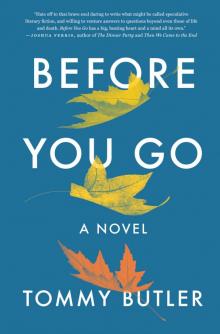 Before You Go
Before You Go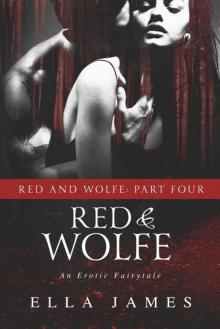 Red & Wolfe, Part Four
Red & Wolfe, Part Four Vegas Royals: A Love Inc. Prequel
Vegas Royals: A Love Inc. Prequel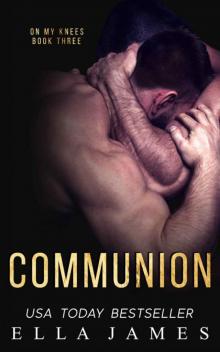 Communion (On My Knees Series Book 3)
Communion (On My Knees Series Book 3)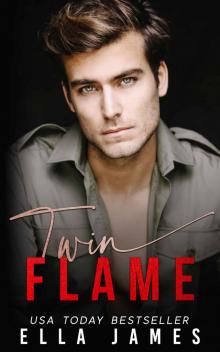 Twin Flame: A Dark Heart Prequel (Dark Heart Duet)
Twin Flame: A Dark Heart Prequel (Dark Heart Duet)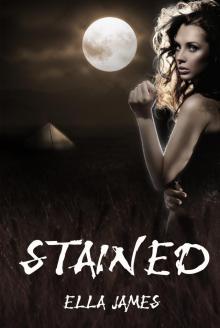 Stained
Stained Sloth: A Standalone Forbidden Romance
Sloth: A Standalone Forbidden Romance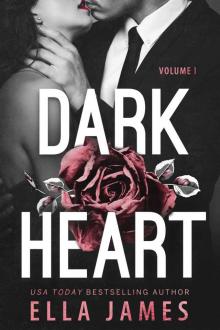 Dark Heart Volume 1: A Star-Crossed Mafia Romance (Dark Heart Duet)
Dark Heart Volume 1: A Star-Crossed Mafia Romance (Dark Heart Duet)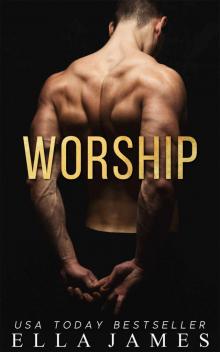 Worship (On My Knees Duet Book 1)
Worship (On My Knees Duet Book 1) Hate You Not: An Enemies to Lovers Romance
Hate You Not: An Enemies to Lovers Romance Taming Cross
Taming Cross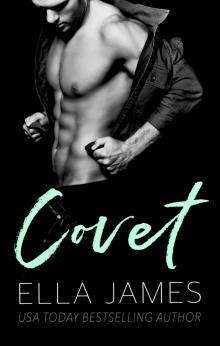 Covet : A Standalone Forbidden Romance
Covet : A Standalone Forbidden Romance Adore (On My Knees Duet Book 2)
Adore (On My Knees Duet Book 2)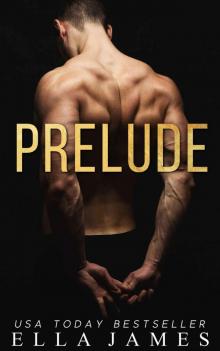 Prelude (On My Knees Duet)
Prelude (On My Knees Duet) My Heart for Yours: A Standalone Forbidden Romance
My Heart for Yours: A Standalone Forbidden Romance Twisted Fate: A Forbidden Romance
Twisted Fate: A Forbidden Romance